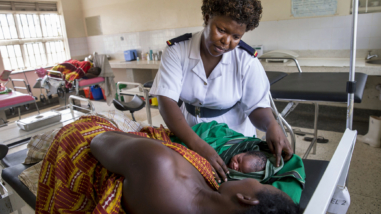The bell has rung. Civil society leaders from India, Pakistan, Senegal, Mali, Nigeria, Mexico, Uganda, Kenya, and Tanzania have come together, with optimism and conviction, asking others to join a movement to ensure that all children learn the fundamental, life-changing skills of reading and arithmetic.
But will anyone answer?
That’s the question I found myself asking just a couple of days ago, as I listened to Dr. Rukmini Banerji, head of the ASER Centre in India, speak on behalf of organizations from diverse countries that administer a simple reading and math test to school-age children each year, and publicly report the results—results that often reveal the dire state of education in their countries and motivate parents and policymakers to act. Before a large international gathering in Delhi, she said that we now know it is both possible and powerful to conduct citizen-led learning assessments. She called on civil society leaders around the world who are committed to better education to let parents, communities, and government officials know the cold, hard facts about whether or not children are learning.
The idea of citizen-led learning assessments is simple, and simply disruptive: rather than depending solely on enrollment statistics reported by government, assessments conducted by volunteers going door-to-door generate new and independent information about what matters—what children are learning. And that information is widely shared so that parents and others see for themselves whether children, in or out of school, have achieved the basic reading and arithmetic skills that can reasonably be expected of any 7- or 8-year-old.
For 10 years, the ASER Centre has conducted a national assessment in India, with data that are representative at the sub-state level—a feat of heroic proportions. Year after year the findings have been shocking. This year ASER reports that while almost all children are enrolled in a government or private school, only one third grader out of four can read a second-grade text. Almost one in five second graders cannot recognize the numbers zero through nine. And as the children progress through the grades, many fall further and further behind.
With the feasibility of this home-grown approach demonstrated in India, civil society organizations in East and West Africa, and in Pakistan have adopted and adapted it in recent years. Now more than a million children are tested annually. And similar efforts are now starting up in Mexico and Nigeria. Technologists, education experts, and leaders in governance and accountability are all participating in the expansion and evolution of this approach.
The work of groups undertaking citizen-led assessments has paid off. At the national level, the releases of each year’s findings set off a chain reaction of responses and accelerate reforms. Most importantly, they force public conversations across societies, and particularly by politicians, bureaucrats, and education experts: How can we improve education for all children?
At the global level, findings about how few children can do the basics, even after attending school every day, have paved the way for an “access plus learning” objective in the Sustainable Development Goals, expected to be agreed by UN member states in September. And the development of that goal has pushed the education community to focus on the vexing question of how to measure learning outcomes affordably, in ways that match in-country technical capacity.
The expansion of citizen-led learning assessments has also created some remarkable international bonds. The Indian team is working closely with counterparts in Pakistan, building strong bonds as they deal with common challenges; the Francophone countries of Senegal and Mali are collaborating on the challenges of translation to French and mother-tongue languages; and Uganda, Tanzania, and Kenya are ensuring that the data are collected in ways that permit comparison and encourage a friendly competition in the East African community.
So now, as we sit on the edge of a global agreement about the importance of learning, these civil society organizations from the Global South are calling on their counterparts in other countries to join the movement. Already they’ve seen expressions of interest, and have been fielding inquiries from every region of the world. As these groups organize, learn, and plan, however, they will need technical and financial resources. With our support for its start-up, the ASER Centre has established an International Unit to help share tools and know-how, including an app for handhelds that saves time and money in data entry and analysis. So the groundwork is being done.
But as this movement to measure children’s learning in an independent and inclusive way takes off, members of the donor community who care so much about better education—who have been so effective in helping governments increase school enrollments—owe it to themselves to take a close look at what citizen-led assessments can do to create an enabling environment for big changes. Not only are they a proven and relatively low-cost way to measure learning outcomes, but they also serve as a crucial external source of data, which will continue to be needed even as government-run assessments proliferate.
I know that we will do what we can to respond to the call. Will others join us?
For more on citizen-led assessments, check out In Celebration of Scale and this short video. The ASER model was also covered in Tina Rosenberg’s article in the New York Times, In India, Revealing the Children Left Behind. And the Indian-Pakistan collaboration is described in this week’s article in the Business Standard by Anjali Puri, A Lesson in Getting On, and Getting Things Done.


